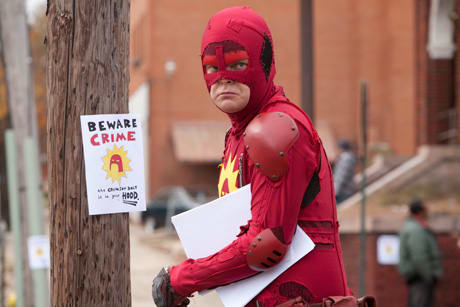Super is bold filmmaking. Whether you're delighted, horrified, shocked, disgusted, titillated, invigorated or, more appropriately, an uncomfortable combination of all these feelings, writer/director James Gunn's follow-up to horror comedy gem Slither will illicit a strong emotional response. While pseudo genre deconstruction Kick-Ass failed to be little more than a winking homage to the standards it was supposed to be satirizing, Super fearlessly takes on the psychology of vigilantism. Rainn Wilson gives the performance of his career as Frank D'Arbo, a naïve, innocent man pushed over the edge of sanity after wife Sarah (Liv Tyler) falls in with a snaky, charismatic drug dealer (Kevin Bacon, having fun with edgy character work). After having a hallucination involving the Holy Avenger (Nathan Fillion, Serenity), a cut-rate evangelical TV superhero, some invasive hentai tentacles and the fingertip of God, Frank believes he's been chosen. Lacking any sense or direction, he loads up on comics about heroes without powers at a local shop, with the aid of hyperactive clerk Libby (Ellen Page in a literally ferocious performance that'll grate on some views, which is kind of the point). Taking on the guise of the Crimson Bolt, the deranged, pathetic, yet oddly sympathetic Frank hits the streets on a mission to make crime "shut up." To Frank, there is right and wrong, nothing in between. Therefore, the same punishment applies to muggers, small fry pot slingers and line cutters ― wrench to the head. Gunn doesn't hold back on the gore; it may seem over the top, but it's about graphically showing the results of serious violence, not being gratuitous. The comedy comes from recognizing the wrongness of our violent inclinations via Frank's overzealous actions. There's also the delusion factor; it's never explicitly stated, but it's visually implied that the warped lens of Frank's mind's eye distorts a lot of what we see. Animated opening credits (done by the team from children's show Yo Gabba Gabba) set the standard for unexpected tonal shifts, providing a window into Frank's childish worldview, which periodically leaks out later in the film. Motivations and intentions are clearly stated and openly discussed by Gunn and Wilson in a very honest, engaging feature commentary and a comprehensive, but not bloated, "Behind the Scenes" segment that also covers a great deal of technical info, between the uncommonly insightful cast interviews and excellent candid footage of Gunn goofing off while directing and Wilson plying the stone will of his deadpan. It's a shame there's no gag-reel. The single darkly lit deleted scene would've been a drag in what's an expertly paced film. "Making of the Main Titles" is a brief, but good look at the animation process and intentions of the style. The animation is naïve and rudimentary, much like Frank's approach to problem solving. One of the darkest comedies ever made, Super is also an extremely effective drama. It's the only film that's ever made me laugh and cry during the same scene. How emotionally confusing― just the way it's meant to be when questioning the sanity of trying to do the right thing the wrong way.
(eOne)Super
James Gunn

BY Scott A. GrayPublished Aug 5, 2011